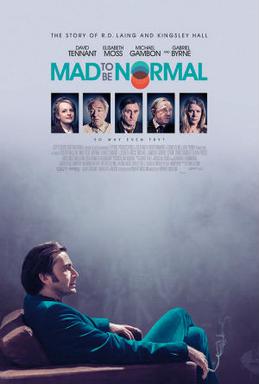Mad to Be Normal
Mad to Be Normal is a British biographical drama film that explores the life and work of Scottish psychiatrist R.D. Laing. Laing was a controversial figure in the field of psychiatry during the 1960s and 1970s, known for his alternative approaches to treating mental illness, particularly schizophrenia. The film stars David Tennant as Laing, alongside a supporting cast that includes Elisabeth Moss, Michael Gambon, and Gabriel Byrne. Directed by Robert Mullan, Mad to Be Normal offers a glimpse into Laing's radical therapies and the unique community he established at Kingsley Hall in London, where patients and therapists lived together as equals.
Plot[edit | edit source]
The narrative of Mad to Be Normal centers around R.D. Laing's work and personal life during the late 1960s, focusing on his experimental community at Kingsley Hall. The film delves into Laing's unconventional methods, such as his rejection of traditional antipsychotic medications and his emphasis on understanding the subjective experiences of people with mental illness. Through the lens of Laing's interactions with his patients and colleagues, the film explores themes of empathy, societal norms, and the nature of sanity and insanity.
Cast[edit | edit source]
- David Tennant as R.D. Laing
- Elisabeth Moss as Angie Wood
- Michael Gambon as Sydney Kotok
- Gabriel Byrne as Jim
- Additional cast members portray various patients, colleagues, and figures in Laing's life, contributing to the portrayal of the complex dynamics within Kingsley Hall and the broader psychiatric community.
Production[edit | edit source]
The production of Mad to Be Normal involved thorough research into R.D. Laing's life and the historical context of his work. Filming locations were chosen to accurately reflect the era and settings of Laing's activities, particularly in and around London. The film's portrayal of psychiatric treatment in the 1960s and 1970s raises questions about the evolution of mental health care and the ongoing debate between conventional and alternative therapies.
Reception[edit | edit source]
Upon its release, Mad to Be Normal received mixed reviews from critics. David Tennant's performance as R.D. Laing was widely praised for its depth and complexity. However, some reviewers critiqued the film for its handling of Laing's controversial methods and the potential romanticization of his approach to mental health care. Despite these criticisms, the film was noted for sparking discussion about the history of psychiatry and the legacy of one of its most polarizing figures.
Legacy[edit | edit source]
Mad to Be Normal contributes to the broader conversation about mental health, the stigma surrounding mental illness, and the history of psychiatric treatment. By highlighting R.D. Laing's radical approach and the challenges he faced, the film encourages viewers to reflect on the current state of mental health care and the importance of understanding and empathy in treating mental illness.
Search WikiMD
Ad.Tired of being Overweight? Try W8MD's physician weight loss program.
Semaglutide (Ozempic / Wegovy and Tirzepatide (Mounjaro / Zepbound) available.
Advertise on WikiMD
|
WikiMD's Wellness Encyclopedia |
| Let Food Be Thy Medicine Medicine Thy Food - Hippocrates |
Translate this page: - East Asian
中文,
日本,
한국어,
South Asian
हिन्दी,
தமிழ்,
తెలుగు,
Urdu,
ಕನ್ನಡ,
Southeast Asian
Indonesian,
Vietnamese,
Thai,
မြန်မာဘာသာ,
বাংলা
European
español,
Deutsch,
français,
Greek,
português do Brasil,
polski,
română,
русский,
Nederlands,
norsk,
svenska,
suomi,
Italian
Middle Eastern & African
عربى,
Turkish,
Persian,
Hebrew,
Afrikaans,
isiZulu,
Kiswahili,
Other
Bulgarian,
Hungarian,
Czech,
Swedish,
മലയാളം,
मराठी,
ਪੰਜਾਬੀ,
ગુજરાતી,
Portuguese,
Ukrainian
Medical Disclaimer: WikiMD is not a substitute for professional medical advice. The information on WikiMD is provided as an information resource only, may be incorrect, outdated or misleading, and is not to be used or relied on for any diagnostic or treatment purposes. Please consult your health care provider before making any healthcare decisions or for guidance about a specific medical condition. WikiMD expressly disclaims responsibility, and shall have no liability, for any damages, loss, injury, or liability whatsoever suffered as a result of your reliance on the information contained in this site. By visiting this site you agree to the foregoing terms and conditions, which may from time to time be changed or supplemented by WikiMD. If you do not agree to the foregoing terms and conditions, you should not enter or use this site. See full disclaimer.
Credits:Most images are courtesy of Wikimedia commons, and templates, categories Wikipedia, licensed under CC BY SA or similar.
Contributors: Prab R. Tumpati, MD

